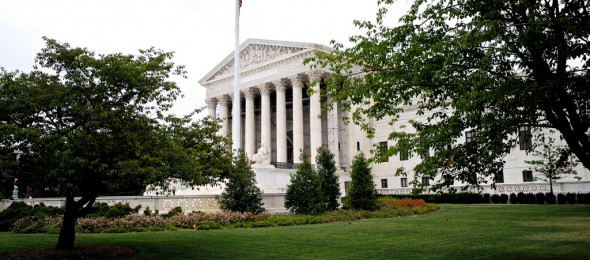The United States Supreme Court has upheld an arbitration clause that bars satellite television consumers from engaging in collective action against the service provider. In DirecTV v. Imburgia, No. 14-462 (December 14, 2015), two DirecTV customers residing in California entered into an agreement to purchase satellite television services from the company. The agreement required all disputes between the parties to be resolved through binding arbitration. In addition, the contract included a class arbitration waiver. The waiver said it was governed by the Federal Arbitration Act (“FAA”), but included a provision stating the entire arbitral agreement was unenforceable if the laws of the consumer’s state rendered the class arbitration waiver unenforceable.
Following a dispute over contractual early termination fees, the consumers filed a putative class-action lawsuit against DirecTV in a California state court. In response to the lawsuit, DirecTV filed a motion to compel arbitration which was denied by the California court. On appeal, the Second Appellate District of the California Court of Appeal held that the class arbitration waiver was unenforceable under state law. Because of this, the appellate court affirmed the lower court’s order denying DirecTV’s motion to compel arbitration. The California Supreme Court declined to review the case and DirecTV filed a petition for a writ of certiorari with the Supreme Court of the United States.
In a 6-3 opinion, the nation’s high court first stated:
The Federal Arbitration Act is a law of the United States, and Concepcion is an authoritative interpretation of that Act. Consequently, the judges of every State must follow it.
After that, the court said the issue in the case was not whether California law was correctly applied by the state appellate court, but instead whether the law itself was consistent with the FAA. Next, the Supreme Court said:
We recognize, as the dissent points out, post, at 4, that when DIRECTV drafted the contract, the parties likely believed that the words “law of your state” included California law that then made class-arbitration waivers unenforceable. But that does not answer the legal question before us. That is because this Court subsequently held in Concepcion that the Discover Bank rule was invalid. Thus the underlying question of contract law at the time the Court of Appeal made its decision was whether the “law of your state” included invalid California law. We must now decide whether answering that question in the affirmative is consistent with the Federal Arbitration Act. After examining the grounds upon which the Court of Appeal rested its decision, we conclude that California courts would not interpret contracts other than arbitration contracts the same way.
The Supreme Court then enumerated six reasons in support of its conclusion before ultimately holding:
Taking these considerations together, we reach a conclusion that, in our view, falls well within the confines of (and goes no further than) present well-established law. California’s interpretation of the phrase “law of your state” does not place arbitration contracts “on equal footing with all other contracts,” Buckeye Check Cashing, Inc., 546 U. S., at 443. For that reason, it does not give “due regard. . . to the federal policy favoring arbitration.” Volt Information Sciences, 489 U. S., at 476. Thus, the Court of Appeal’s interpretation is pre-empted by the Federal Arbitration Act. See Perry v. Thomas, 482 U. S. 483, 493, n. 9 (1987) (noting that the Federal Arbitration Act preempts decisions that take their “meaning precisely from the fact that a contract to arbitrate is at issue”). Hence, the California Court of Appeal must “enforc[e]” the arbitration agreement. 9 U. S. C. §2.
Finally, the U.S. Supreme Court reversed the decision issued by the California Court of Appeal and remanded the case.
Justices Thomas, Ginsburg, and Sotomayor dissented from the majority opinion. According to Justice Ginsburg (who was joined by Justice Sotomayor):
It has become routine, in a large part due to this Court’s decisions, for powerful economic enterprises to write into their form contracts with consumers and employees no-class-action arbitration clauses. The form contract in this case contains a Delphic provision stating that “if the law of your state” does not permit agreements barring class arbitration, then the entire agreement to arbitrate becomes unenforceable, freeing the aggrieved customer to commence class-based litigation in court. This Court reads that provision in a manner most protective of the drafting enterprise. I would read it, as the California court did, to give the customer, not the drafter, the benefit of the doubt. Acknowledging the precedent so far set by the Court, I would take no further step to disarm consumers, leaving them without effective access to justice.
In contrast, Justice Thomas stated he believes the FAA does not apply to state court proceedings.
Photo credit: romanboed via Foter.com / CC BY














